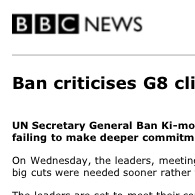
Recent News
December 15th, 2011
October 20th, 2011
May 23rd, 2011
April 14th, 2011
March 2nd, 2011
Climate agreement a 'breakthrough'
Here is a smattering of news reports from last week's "breakthrough" climate agreements at the G8 Summit and the Major Economies Forum, which includes the G8 countries.
Here is an excerpt from the G8 Chair's Summary report on the climate change discussions. The full report is here.
In the G8 session:
- Leaders
recognised the scientific view on the need to keep global temperature rise
below two degrees Celsius above pre-industrial levels, and agreed on a global
long-term goal of reducing global emissions by at least 50% by 2050 and, as
part of this, on an 80% or more reduction goal for developed countries by 2050.
- They
also agreed on the need for significant mid-term targets consistent with the
long-term goals and for global emissions to reach their peak as soon as
possible.
- The
active engagement of all major emitting countries through quantifiable
mitigation actions was highlighted, as an indispensable condition to
successfully tackle climate change.
In the broader MEF session:
- Participants
adopted the Major Economies Forum on Energy and Climate Declaration.
- In
it, they reiterated the importance of keeping the increase in average global
temperature below 2 degrees Celsius, as recognised by the G8, and agreed to
work together between now and Copenhagen to identify a long-term global goal
for substantially reducing global emissions by 2050.
- Participants
included the 16 Leaders of the Major Economies Forum on Energy and Climate, the
European Commission, Sweden, Denmark and the UN Secretary General.
The Climate Group calls the G8 and MEF communiqués a "mixed bag".
The Economist calls the agreement a "modest step", reminding us that "hitting the target will be much harder than agreeing on it".
WWF "welcomes the leaders' initiative", but labels the two degrees target "an empty statement" because it says nothing of how to achieve the two degrees goal.
European Commission presidentJose Mauel Barroso suggests it's a strong start and provides a benchmark for the climate talks in Copenhagen. "If you accept this (2 degrees), the rest will come. It is logical... We are not there yet and there is still a long way to go in the 149 days after this summit to Copenhagen. But if we have this agreement, then we can fill in all the other lines. These negotiations are always decided in the final meters and the last few meters are always difficult. But when you arrive in the final meters with these agreements already in place, real progress can be made."
IPCC chief Dr. Rajendra Pachauri seems not to share the same enthusiasm. He says the outcome falls short, because it fails to reflect the IPCC's assessment that if we want to limit the increase to two degrees, we have to ensure that emissions peak no later than 2015.
"They should have clearly come up with what they are going to do about reducing emissions in the immediate, short run. They haven't done that."
However, the world will not meet 2 degrees C warming target, according to a March 2009 survey of climate change experts. While policymakers and campaigners focus on the 2C target, 86% of the experts told the survey they did not think it would be achieved. An average rise of 4-5C by the end of this century is more likely, they say. In Climate Change Calculus, Sharon Begley offers even less hope that we'll cap at 2 degrees C.
Not everyone agrees that 2 degrees C is even enough. Small island states argue for a 1.5 degrees C cap, saying that 2 degrees of temperature rise exceeds safe thresholds necessary for the protection and survival of small islands
Here is a little more background on the history of the 2 degrees target, and why it may not be good enough.
This analysis from independent journalist Gwynne Dyer is a bit different from the others here, but a worthwhile read. The G8 summit decisions on climate change were much less than is necessary, but the very best that a realist could have hoped for. "It can't be helped: that's the way we do business".
And this critical analysis, from an Indian perspective, highlights the issues of equity and burden-sharing that are essential to a workable climate agreement.
